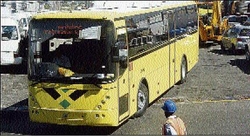JUTC set to increase prices even as Smart Card sales jump
Published: Friday | March 27, 2009

New Jutc buses at the Kingston Wharves. - Ricardo Makyn/Staff Photographer
The Jamaica Urban Transit Company (JUTC) is increasing the fare for its premium and express services effective April 1.
This comes at a time when the state-owned bus company is reporting a significant increase in Smart Card sales but, according to Reginald Allen, communication manager at JUTC, regular bus routes will not be affected.
"Yes, there will be an increase," he said.
"All the stages that enjoy these special services will be affected."
One of JUTC's strategies to boost revenue includes entry into the value end of the transport market, which was once monopolised by the Ezroy Millwood-led National Transport Co-operative Society.
Express routes to destinations such as Spanish Town, Green Acres, White Water Meadows, Angels, Harbour View and Kingston cost $60 to $80 per ride, compared to the $50 passengers pay for a regular ride.
The air-conditioned premium rides cost $100 per trip to Portmore. Longer journeys cost $120 and $170.
"Those who used to pay $60, $80 and $100 will now pay an additional $20, while the routes that previously cost $120 will go to $150, but the lengthier journeys will move from $170 to $250." Allen said.
The communications manager blamed the increase on operational costs.
In the red
While the JUTC is deep in the red, Allen was quick to dismiss any suggestion that the price-hikes were to cover losses from areas outside of its operations having to deal with its premium and express services.
There are 30 express and 24 premium buses, while there is a daily roll-out of more than 300 for regular routes.
At the same time, smart card sales have increased by 85 per cent
with approximately 100,000 cards being sold in 2008 compared to 15,000 in 2007.
This year alone, more than 20,000 cards have already been sold.
There are over 250,000 active smart card users on the system and according to Marketing and Sales manager Lenworth Simms, the amount is growing significantly.
"In 2007 the usage of smart cards accounted for four to five per cent of total income. In 2008, it went up by 20 per cent and, so far in 2009, it is up by over 25 per cent."
This, he attributes to the company's public education campaign.
"We have been working with our Smart Card dealers and we have been pushing it at the transport centre and at all our outlets, we are also paying out bonuses to passengers, who top-up or purchase their Smart Card to $300 0r more each time."
Simms added that, so far, between $30 and $35 million dollars was generated per month in revenue for the state-owned bus company.
There are approximately 60 outlets operating throughout Kingston and St Andrew and St Catherine, including 20 schools, eight post offices and a number of public-sector outlets.
The plan for a complete roll-out of the smart card system is currently under review.
"Last year July, the premium service went cashless, that is about 28 ultra luxury buses. The same thing happened with the express buses last month and we are in the process of accepting that exercise with a view of expanding it."
"We have been trying to emphasise to our passengers that the use of the smart card is safer than cash. If you lose it as soon as you report it to us, we shut it down and replace it. It is safe, secure and convenient."
The JUTC smart Card was first introduced in 2000 as a way to increase revenues for the company and make buses safer for passengers and crew.
mark.titus@gleanerjm.com











